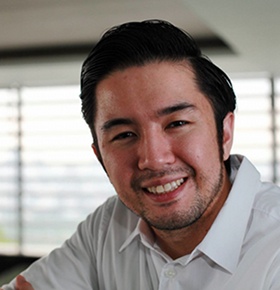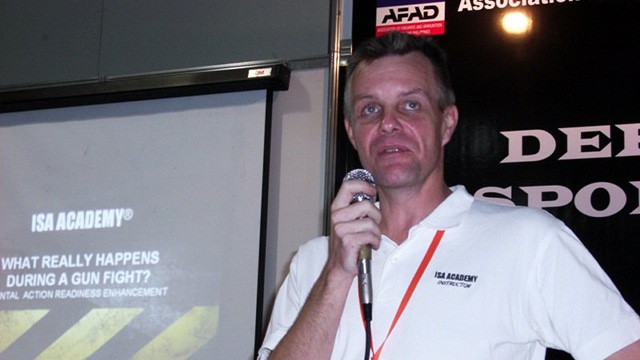SUMMARY
This is AI generated summarization, which may have errors. For context, always refer to the full article.
 Rather than simply let the story of Kristelle “Kae” Davantes affect us emotionally, we, as businesspeople and as entrepreneurs, must learn from the tragedy.
Rather than simply let the story of Kristelle “Kae” Davantes affect us emotionally, we, as businesspeople and as entrepreneurs, must learn from the tragedy.
The honest truth is that being a successful, financially sound businessperson here in the Philippines may make you a target for crime.
Before even advancing our careers or growing our businesses, we must take the steps necessary to ensure our safety. It is with this spirit that I approached International Security Agency (ISA), an international firm that provides executive protection for diplomats and executives.
The head of ISA’s Philippine operations, Leo Strand, gave me insight into how to be safe in the country. A former commissioned officer of the Swedish special forces unit once entrusted with the protection of the royal family, Strand has trained military and police units all around the world.
Strand spoke of how the rather exotic business of executive protection may be relevant to the everyday entrepreneur or businessperson. As the Philippines is behind in the world in many industries, people may be tempted to simply copy and paste a business model from abroad into the Philippine context.
This would be a mistake, Strand cautioned. Even in an industry concerned with the universal issue of safety, it’s important to localize the approach to your market. ISA is accomplishing just that in its culture, in its personnel, and in its pricing. Filipino entrepreneurs and executives, especially those introducing a new business into the country, need to make it a point to do the same.
Here are snippets from our chat:

EF: Can you tell me about what ISA does?
LS: We do anything related to security. We train police, military, and special forces units of governments around the world. We also do security consulting—to give you an indication of our scale, we did the 2004 Olympic Games in Sydney.
Most commonly, we do executive protection, with the vast majority of our clients being either foreign executives or foreign diplomats. Between our clients, you’d get a range of risk, but at a minimum, they’re all high level.
EF: How do you get them as clients?
LS: There’s no bidding process as you might think.
We usually get clients through referral through the embassy or through company representatives. Since we’ve built relationships with governments by training their various units, they know what we do and they trust we can more than meet the complexities required in executive protection.
Unlike Philippine bodyguards, or even other executive protection agencies, our focus is on proactive rather than reactive security.
This is the Scandinavian model of security.
EF: What does it take to practice the Scandinavian model of security?
LS: With ISA, at least, the requirements are very strict. At a minimum, we require our candidates to have a bachelor’s degree. From there, they usually hail from a police, military, or special forces background. They must especially be good at shooting and at hand-to-hand combat because those are the things we expect to rarely do. The goal in the Scandinavian model of security is to be non-confrontational, no matter the context.
EF: So has the Scandinavian model been successful in the Philippines?
LS: It’s been successful the world over. In our over thirty years of existence, we’ve never lost an agent or a client. Part of the reason is because it’s remarkably functional. It borrows from all the others and only keeps what works, making it a point to adapt to the local culture.
Others, I’m afraid, don’t do this. When faced with a threat, you might see Filipino bodyguards all hop out of their convoy and look around aimlessly. Or worse, you might get Americans trying to Americanize the Philippines. You can’t drive around in limos here.
EF: How different or similar is your business with others?
LS: From a business standpoint. Mind you, when most people see us, they think of us as a military or police unit. But we’re a business in the same way that a restaurant or a department store is. We have to be concerned with profit and loss.
If we tried to force what works in other countries onto the Philippines, we would not be as financially successful as we are today. We would have lost clients. We cannot act the same way we do in Mindinao as we would in the Middle East, even though both ostensibly involve defending against terrorists or insurgents.
This is the truest advice I can give to any businessperson: Adapt, adapt, adapt. You must localize to your market, no matter your field. In my line of work, it can mean the literal difference between life and death.
In others, it’s no less as important—your business is your livelihood, after all. You cannot risk losing customers or clients because you didn’t think in terms of the cultural context.
EF: Can you give an example of thinking in terms of the cultural context?
LS: It may be as simple as in your personnel. In Singapore, our office is fronted by Singaporeans. In the Philippines, it’s fronted by Filipinos. That makes prospective clients much more comfortable in approaching us.
The Philippines is also a polite society. While you might get other Western companies who have this my-way-or-the-highway attitude, we’re much more accommodating in how we interact with our clients.
Thinking culturally even filters down into the hard numbers of our business. It’s sort of a project I’m working on now.
EF: Can you tell me more about it?
LS: A two-person security detail with ISA is not cheap. We’ve got many expenses to cover in the way of insurance costs and agent salaries and so on. Our agents work on a contract-to-contract basis.
So one of our agents will be on duty for two weeks, which is the typical length of a business or diplomatic visit, and then be on stand-by for the next contract. But we get a steady flow of clients, and our agents are compensated at European Union, rather than Philippine rates.
This is a challenge. At present, we’re currently cost-prohibitive to most Filipinos in terms of pure numbers. There may also be a cultural barrier: Filipinos may not understand the value of an executive security firm. They may think a guy in a barong is enough.
EF: Why are security guards not enough?
LS: Simply put, a security guard is not an executive protection officer. To use an analogy, how many people would hire a nurse to conduct critical surgery on themselves instead of a qualified doctor?
A security guard is only qualified to observe and report—that is all their licensing qualifies them for. The same goes for all the off-duty police officers that moonlight as bodyguards. They might be trained in the law enforcement trade, and do an excellent job there, but the protection realm is not about reacting when something happens.
It is to make sure the opponent is denied the opportunity to act in the first place. So to sell potential clients on the value of ISA, I’ve been recruiting and training Filipinos as executive protection officers. This will allow us to maintain the excellent European standards of ISA, while providing our services at a more affordable rate.
And to get our name out there, we’ve been conducting seminars for the major, iconic Philippine corporations. Again, succeeding in business all comes down to thinking in your cultural context.
EF: Can you share some of what you teach to Filipino businessmen?
LS: We teach a concept called situational awareness. Paying attention to your surroundings is a part of it, yes, but it comes down reading the people around you.
EF: How do you teach students to accurately read people?
LS: I tell all my students to look for behavior patterns. If you’re walking down the street late at night, how can you tell if the person standing on the sidewalk up ahead has ill intentions of some kind?
Most people—if you’ll look around us now—walk around relaxed, unless they’re under some form of extreme stress. Then their body will tense up. They’ll square their shoulders and walk around stiffly.
EF: These same principles apply to criminals?
LS: Only more so. If you’re a bad guy, you’re not only stiff, but you’re also scanning your surroundings. You don’t want police or security guards or witnesses to be around, after all.
So if that guy on the sidewalk keeps darting his gaze around, you may want to move to the other side of the street.
EF: What if you fail to notice the suspicious person until you’re already near him?
LS: That’s part of what we teach. We discourage anything that reduces your ability to be situationally aware, such as walking around, while texting or talking on your iPhone.
EF: What if—for the sake of argument—a person did fail to be situationally aware and found themselves in a dangerous situation?
LS: It happens unfortunately. But to return to our previous example, let’s say that the suspicious guy starts to follow you down the street after you pass him. No matter the exact situation in which this happens, you should always put yourself in a position of advantage within the local context.
The most obvious example, assuming the opportunity is available, is to place yourself near security guards or policemen. If a crowded area is nearby, like a mall or mercato, duck into there.
The chances of someone committing a violent crime against you in a crowded, busy place are much slimmer.
In any situation, there will be the opportunity to gain the upper hand. Let’s say you’re on a street with little pedestrians but a lot of car traffic. The first thing you can do is stop and look at the person who is following you in the eye.
This indicates that you know that he is there and that you know what he looks like. It’s also a way for you to project power, which should deter the criminal. Most of them have the mentality of a predator out in nature—they want to prey upon the weak.
If you appear strong, they’ll be far less likely to target you.
EF: After projecting your strength, what do you do next?
LS: From there, you can U-turn into the other direction. That person, if he had ill intent, would be extremely surprised by this.
If in the rare chance he continues to follow you in the opposite direction, you can position yourself in such a way, that, were he to try anything, you could throw him into oncoming traffic.
EF: What should you do if you can’t use the environment to your advantage?
LS: This may be the best advice of all: If you truly are trapped by a threat, say, a hold-upper, it’s always best to just comply, as long as it does not put you at greater harm or increased risk.
You can always replace a smartphone, get the numbers of your friends again, however, much of a hassle that is. You cannot, of course, replace your life. – Rappler.com
Rappler business columnist Ezra Ferraz graduated from UC Berkeley and the University of Southern California, where he taught writing for 3 years. He now consults full-time for educational companies in the United States. He brings you Phlippine business leaders, their insights and their secrets via Executive Edge. Follow him on Twitter: @EzraFerraz
READ:
[Executive Edge] Filipino innovator’s dilemma
What do bitcoin and remittances have in common?
Add a comment
How does this make you feel?
There are no comments yet. Add your comment to start the conversation.